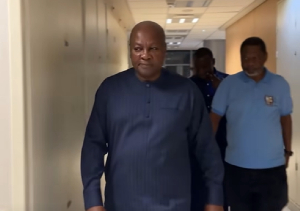By Kwame Okoampa-Ahoofe, Jr., Ph.D.
Garden City, New York
Nov. 28, 2014
E-mail: okoampaahoofe@optimum.net
The patently unethical practice of offering money to journalists covering social and cultural events in Ghana was firmly entrenched some three decades ago, when I departed the country for the United States. And I personally witnessed several instances of "soli" payments. Now, I don't know the origin of the word, but "soli" strikingly sounds like the English word "solicitation," a noun whose verbal inflection, of course, is "solicit."
Observing the way that it is transacted between journalists and the hosts of social events, "soli" can actually feel insufferably infra-dig on the part of the mature media practitioner with an acute sense of self-worth and dignity. Oftentimes, the practice verges on downright beggarliness. What media executives like Mr. David Agbenu, editor of the Ghanaian Times, who also doubles as General-Secretary of the Ghana Journalists' Association (GJA), ought to be advocating is the establishment of travel funds by the various media organizations for reporters dispatched to cover events which entail paying considerable sums of cedis for transportation.
Such travel funds could be made a part of the operating budget of the concerned media organization. In fact, it is precisely because of the existence of the unsavory practice of "soli" that Ghanaian journalists are generally not accorded the level of respect that most media operatives and practitioners are routinely accorded in other countries, particularly the advanced democracies. And whether he realizes it or not, "soli" has a palpable tendency of influencing the judgment and professional practice of the trade in the country.
I have written about this sordid practice, as it is done in Ghana, in the past and so I find it unnecessary to belabor the issue in this column. Suffice it to say, at least in passing, that about the only material exchange between a reporter and the host of an event that is not tantamount to "soli," or bribery, is the serving up of goodies, such as a plate of dinner and a bottle or two of drinks. In fact, at many reputable American media houses, ethical codes of conduct are clearly set out for journalists and reporters, and anybody who breaches the most serious of these is often promptly and severely disciplined, including outright dismissal.
But here in Ghana, we have the editor of a leading national newspaper telling the whole world that the importunate solicitation of favors for work for which a reporter is duly salaried is all well and good. And so, really, is there any good reason for anybody to be mournful about the generally poor quality of journalism and other media production in the country? One also begins to clearly appreciate the fact that many media operatives did not see anything egregious about the Kenu-Baffuor Gyan Affair.
And also just what does he mean, when Mr. Agbenu asserts that "Wherever they will take you might be a bit out of the jurisdiction of the meadia institution and the media institution might not be able to transport the journalist"? Does it mean, in practical terms, that it is often the newsmaker, or host of a social event, who determines how far a reporter needs to travel in order to cover an event, rather than the other way around? And in case of a serious accident, including fatality or death, who bears the responsibility here?
Several years ago, the (Ghanaian) Timesonline used to publish some of my articles until I made it plain to the "soli"-befuddled online editor, a guy by the name of Douglas Akwasi Owusu, or some such name, that I was not prepared to purchase him the laptop that he earnestly claimed he needed to considerably enhance his editorial work at the Times, in exchange for getting my articles regularly published for free. Now it is disturbingly clear to me that the "soli" mindset of Mr. Owusu is far more the norm than the exception or aberration on Ghana's media landscape and culture. What a pity!
_____________________________________________________________
Opinions of Tuesday, 2 December 2014
Columnist: Okoampa-Ahoofe, Kwame














